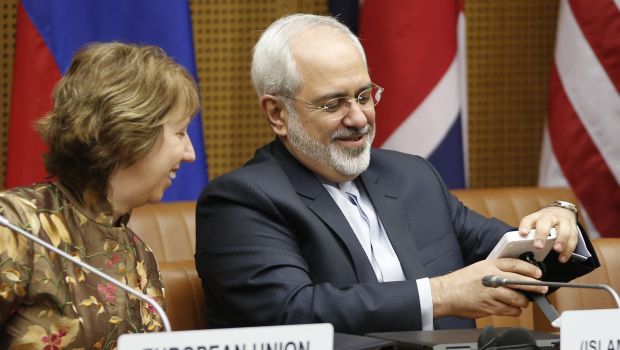
European Union foreign policy chief Catherine Ashton (L) and Iranian Foreign Minister Mohammad Javad Zarif wait for the start of talks in Vienna May 14, 2014. (REUTERS/Leonhard Foeger)
The Iranian foreign minister tweeted: “Agreement is possible. But illusions need to go. Opportunity shouldn’t be missed again like in 2005.”
Zarif’s comment most likely referred to negotiations between Iran and the UK, France and Germany in 2005, which made some progress in resolving international concerns about Iran’s controversial nuclear program, but were rejected by the US.
The comments were made two days after the end of the latest round of negotiations between Iran and the 5+1 powers (the five permanent members of the UN Security Council and Germany). At the end of the talks, Zarif’s deputy Abbas Araqchi said the negotiations did not produce any significant progress.
In a statement to Iranian journalists on Friday at the end of the fourth round of talks in Vienna, Araqchi said: “We have not achieved any tangible progress in this round which focused on writing the final draft of the comprehensive nuclear agreement.”
Araqchi added: “The fact that no progress was made in the final round of the nuclear negotiations does not mean that the negotiations have totally collapsed, because the prevalent atmosphere over the negotiations was positive.”
Despite the possibility of extending the deadline agreed as part of an interim nuclear agreement, both sides are eager to achieve a comprehensive agreement by July 20, when the interim deal is set to expire.
In another statement made to the official Iranian news agency on Saturday, Araqchi said the next round of talks would take place in June.
Despite the lack of progress in last week’s talks, some analysts remained optimistic about the chances for a deal.
University lecturer and political affairs expert Dr. Fayyad Zahid told Asharq Al-Awsat on Sunday that he did not expect the nuclear negotiations between Iran and the major powers to fail.
Zahid said: “The failure of the nuclear negotiations will lead to a strengthening of the extremists’ stances in the US and Iran. This will create many unpredictable problems for Iran and the US, and therefore, Iran and the US are eager to reach a nuclear agreement on schedule.”
Meanwhile, Reuters said a representative of the UN’s nuclear watchdog, the International Atomic Energy Agency (IAEA), would travel to Tehran on Monday to hold talks about the measures taken by Iran regarding its nuclear program.
IAEA inspectors have visited Iran a number of times since January to supervise the implementation of the interim nuclear agreement, which reduced some of the economic sanctions on the country in return for the suspension of some nuclear activities.
During their visits, IAEA inspectors supervise the seven measures that Iran is expected to implement in order to make its nuclear program more transparent. These include Iran providing information on the design of the heavy-water reactor under construction at Arak, and its research into bridgewire detonators, which can be used in nuclear warheads.
Iran denies its nuclear program has any military objectives.
The IAEA announced on Monday, May 12, that Iran was making more effort to make its nuclear program more transparent.
However, the agency called on Iran to clarify evidence that Iran had researched the manufacture of atomic bombs prior to 2003, and that it may have continued to carry out such research up to the present time.
Iran said the evidence was based on erroneous information from US and Israeli intelligence.
Some observers say Iran has failed to respond to questions which required accurate details about its nuclear program, and there are a number of issues which remain unresolved in this regard.
Former IAEA Deputy Director-General for Safeguards Olli Heinonen told the Associated Press agency that the Iranian response was the same as when the same issues were raised in 2008.
